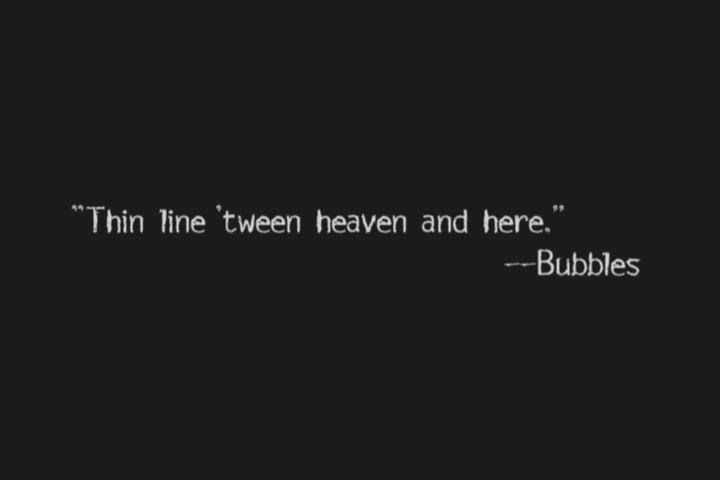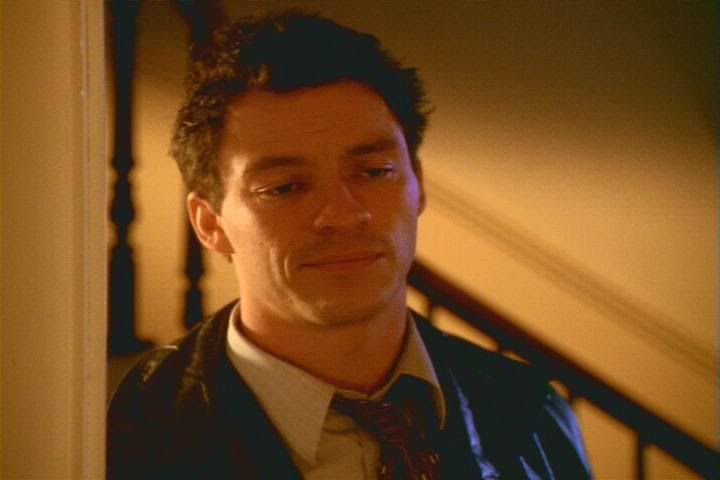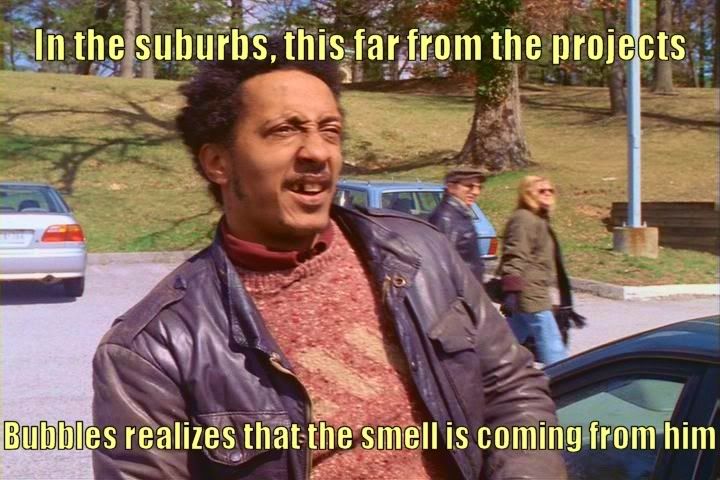"Old Cases" (1x04)

In which I'm tempted to abandon this project so that I can get on with watching this show in bunches.
Read more after the jump.
The famous "fuck" scene isn't as fun to watch when you already know what and how it happened. However, I did notice the chip on McNulty's shoulder with his aggressive outward-directed "motherfucker"s, as though whatever bogey- or bossman he has to buck against was literally in that kitchen, personally thwarting him and his idea of gratification. As a contrast to Jimmy, Bunk mines that curmudgeonly, grumpy old man sort of profanity.

An idle musing. Beyond simply showing how empty his life is, McNulty's late-night drunken visit to Kima and Cheryl's apartment and his impromptu Bring Your Snitch to Your Kids' Soccer Game Day point to the collapse of the domestic sphere and the work sphere. While in certain areas of employment (like law enforcement), work can affect the home front in dramatic ways (e.g. Kima's shooting leading to her and Cheryl splitting up), McNulty's example more generally illustrates how different institutions are all interconnected, and how a change in one sphere can ripple out to others. In an inverted sense, we'll see how Duquan's domestic situation dictates which aspects of life are open to him (almost none), but for now, we'll have to make do with McNutty using his sons to trail Stringer.
When Bodie slipped out of the juvenile detention facility, he demonstrated how invisible black youths can be -- people who are part of the system (i.e. most of us) already don't want to acknowledge his presence, but when you put a mop in his hand, he completely disappears.
More echoes from The Corner: Bubbles reminds me of Gary McCullough; smart, resourceful, but fallen on very hard times.

Unlike Gary, Bubbles is tied in with the drug trade at multiple levels -- he's there on the consumer level, obviously, but he also has his ear on the criminal activity (schooling Kima on No-Heart Anthony Little, noting Omar's getaway van when the crew was ripping and running from the previous episode), because of which, he works as a criminal informant for the cops -- which I'm tempted to say in my less rigorously thought-out state is David Simon's way of saying that the drug trade itself is the nexus around which criminals and police revolve.
Indie rating: Electric Wizard - "Vinum Sabbathi"
4 comments:
Thanks for doing this -- I just found this blog, and literally finished re-watching Season 1 this morning, so this couldn't come at a better time. Fantastic analysis. Please keep it up. FWIW, if I'm not mistaken, Bubs is based directly on Gary McCullough, so your observation is spot on.
Thanks Michael for the kind words and the tip on the Bubbles/Gary M. connection.
Some additional points that I only recently stumbled upon:
D taking credit for the murder of Deirdre Kresson prefigures the 20-year rap he ends up accepting, i.e. he shoulders a load for which he wasn't principally responsible.
McNutty's antipathy for the Bosses has him making excuses for Santangelo's absence from Daniels' detail, even though Santangelo is on the detail solely to spy on McNutty. THIS IS CALLED IRONY.
But wasn't that D just trying to look hard for Bodie and the boys? I don't know if he was shouldering the load so much as taking undue credit for Bey's deeds. (I also wonder if that was just some deliberate misdirection by Simon and co., so we'd be surprised with the reveal at season's end.)
D's storyline is one of if not the most wrenching of the series. In a way, it's more compelling (if not necessarily more "tragic") than even those of Michael and Duqwan in S. 4 and 5, because D better understands the gravity of his choices. He's a smart, thoughtful grown man who never asked for this life, who doesn't want this life, but who nonetheless has profited from it and sees its benefits. Worse, he's trapped in it by his circumstances, the pressures of his family, his own mother. Tough to watch. While he's not the star, he's really the central character of S. 1.
Michael, for sure D was trying to hype himself up for the benefit of Bodie, Wallace, and Poot, but the basics of his supposedly murdering Deirdre parallel his taking the years for Avon. Sort of like, "D'Angelo, you want to take credit for a murder you didn't do just to look like a big shot for the hoppers? Well, you get to take twenty years now for the all the dirt your uncle did." Irony in an O. Henry sense.
Post a Comment